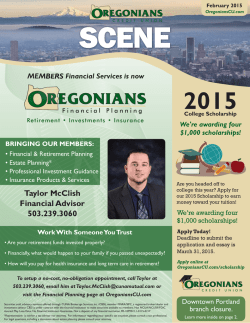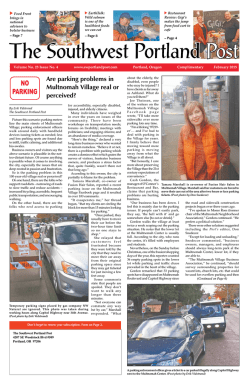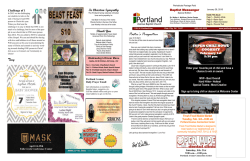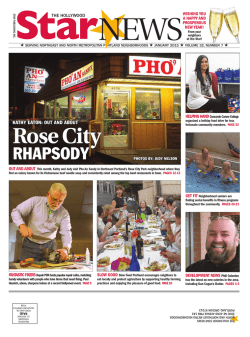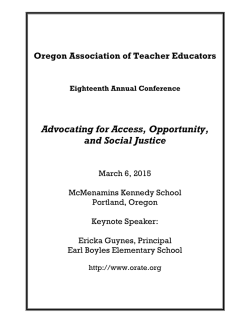
SThompson speech -final - Portland Public Schools
State of the Schools Address Mayor Brennan and members of the council, I am pleased to be with you this evening on behalf of the Portland Board of Public Education to present the third annual State of the Schools address to you and the citizens of Portland. Tonight I want to talk with you about the Portland Public Schools’ accomplishments and challenges, our priorities and our plans for the future. Overall, Portland’s schools are in good shape and we have plans to make them better. The board and the superintendent are working well together, bringing stability and focus to the running of our school system. We are guided by a comprehensive plan framework and measurable results. We are engaging the Portland community in many new and exciting ways. I want to express my appreciation for the collaboration that we enjoy with the City Council and city staff. We have distributed a factsheet for you tonight. I hope you will take a look at it when you have a few minutes. Let me share some highlights: School improvement work at Riverton and East End elementary schools is paying off, with dramatic improvement over the past four years at schools that have significant poverty levels. One year after the School Improvement Grant ended at Riverton, we continue to see student achievement increases in writing, with students outperforming the district and state averages. This data supports the district’s allocation of resources to align curriculum, provide instructional coaching, and ensure time during the school day for teachers to plan instruction and curriculum based on formative student data. Presumpscot Elementary School, another school with a high poverty rate, recently won recognition by the Maine Department of Education as a “High Performance Reward School” based on student achievement and improvement. Students in the district’s five preschool classrooms continue to demonstrate literacy skills at the level typically seen at the end of kindergarten. We’ve increased participation in the extended summer learning program for grades K to three. More than 93% of students in the program maintained or increased their reading level during the summer, a time when many students fall behind in their learning. Students in high schools across the district are participating in extended learning opportunities supported through the district’s Nellie Mae grant. Our district worked with Jobs for Maine’s Graduates to organize a recent college and career expo that was attended by more than 500 of our high school students. Advanced Placement participation has increased at all of our high schools. I am pleased to report that the Portland Public Schools focus on writing in the elementary grades is beginning to show improvement in the New England Common Assessment Program, or NECAP. The district average performance of our grade 5 students on the writing portion of the NECAP is 6% above the state average. Three subgroups of students - Black/African American, Limited English Proficient, and those living in poverty - also are performing above state averages. That continues through grade 8, where the district performance exceeds the state average by 8%. Based on this data, we are supporting implementation of an aligned curriculum, instructional coaching, and ongoing professional development in the FY15 and multi-year budgets. Now, I will move on to some of the challenges that we face. By the time our students move into high school, they are achieving below state averages in critical reading, mathematics, and writing. The 2012-2013 graduation rate for Portland Public Schools is below the state average, 79.5% compared to 86.4%. However, a promising piece of data is the 5-year cohort graduation rate at Casco Bay High School. Ninety point 8 percent (90.8%) of Casco Bay students who began grade 9 in 2008-2009 had graduated by 2013. This is evidence that proficiency-based curriculum and instruction, along with extended time, can lead to student success. In an effort to improve accountability and transparency, Superintendent Manny Caulk recently presented the first Portland Public Schools District Scorecard. The scorecard provides data from the past two school years for student performance on state assessments in reading, writing, math and science and for English language learners’ performance on the ACCESS test. It also includes data about student attendance, graduation rates, enrollment in AP and dual enrollment classes, PSAT and SAT scores and other indicators of college readiness. The scorecard gives targets for boosting performance in the current school year and by 2017-2018. Unfortunately, the scorecard shows clearly that children living in poverty, those with limited English proficiency and minority students – especially Black/African-Americans – are falling far behind their peers, across all grade levels and in nearly every category. For example, only 46 percent of third grade students from economically disadvantaged homes scored proficiently in reading during the past two years, compared to 62 percent of all district third graders. To address these challenges, the Superintendent will appoint a group of community leaders to a new Equity for Excellence Council. The council will work with our senior leadership team to develop Equity for Excellence strategies that can provide more support for struggling learners while making our schools more welcoming and respectful of our students’ diverse cultures. This is just one example of ways that we are engaging the community to support our students. The district’s Comprehensive Plan Framework has three overarching goals: All Portland Public School students will graduate from high school. All Portland Public School graduates will demonstrate college readiness in the areas of academics, communication, and critical thinking. All Portland Public School students will participate in activities that demonstrate service to our community, individual creativity, and physical wellness. In working to meet these lofty goals, we have grouped various initiatives into four key focus areas. The first area is strengthening the core academic program. We are investing in a curriculum aligned with Common Core standards – from an elementary phonics program to a high school mathematics program. The Common Core curriculum represents a fundamental change in how we move students through our system. It seeks to ensure that students graduating from high school are prepared to enter two-year or four-year college programs or to enter the workforce. It means students will advance and, ultimately, graduate based on proficiency, not simply meeting credit requirements. Maine law requires that, beginning with the class of 2018, students graduating from high school must demonstrate proficiency in the content areas of career and education development; English language arts; world languages; health, physical education and wellness; mathematics; science and technology; social studies; and visual and performing arts. We have created a Graduation Policy Task Force, chaired by former Board chair Kate Snyder, to bring Portland Public Schools' policy into alignment with state law. The task force will draft a policy recommendation that will be presented to the Portland Board of Public Education in May of this year. The arts are an integral part of our core academic program. In addition to the visual and performing arts offerings at our schools, we are fortunate to have partnerships with local arts organizations. Every year, all students in kindergarten through grade 12 are able to attend a performance by the Portland Symphony Orchestra, Portland Stage, and Portland Ovations and to visit the Portland Museum of Art. Our second focus area is stimulating progress to address the needs of all learners. For example, we want all multilingual students to become proficient in English and to achieve the academic standards required of every student. We have a current enrollment of 1,700 English Language Learners (ELLs) speaking about 60 different languages, making us the most linguistically and culturally diverse school district in the State of Maine. An audit is now underway of the district’s ELL program and we will begin implementing some of the recommendations in the coming year. More than a thousand of our students have identified learning challenges. We are working to provide them with a full continuum of services, including high quality, rigorous and relevant “core” instruction and “research-based” interventions. We expect every school to implement a systematic approach to identifying struggling learners through the use of data, and we are investing in professional development for staff to improve their skills in working with these students. We also are stimulating progress with the 5% of students who are identified as gifted and talented. We currently have 352 students in the Academic Gifted and Talented Program, with an additional 29 students in the Visual Arts and approximately 48 students who are currently being screened for identification in the Performing Arts. We provide appropriate services to students identified as gifted and talented. Our third focus area is driving innovation. We are creating new opportunities for our students to learn about Science, Technology, Engineering and Mathematics, or STEM. The Portland Public Schools is offering a special STEM Graduation Endorsement option in all high schools. We also are expanding world language instruction, including Spanish, French, Latin, Greek, Arabic, Mandarin and American Sign Language. We are investing in extended learning opportunities for students through online courses, expansion of AP and dual enrollment college courses and developing internships and other community-based learning experiences for students. Our fourth focus area is infrastructure. During the past year, we solved some of our major infrastructure needs. We moved Portland Adult Education into the former Cathedral Grammar School, a place that provides a respectful learning environment for our adult learners. With the help of the City Council, we purchased a building at 353 Cumberland Avenue that will provide a home for the West Program, Central Office and the Multilingual and Multicultural Center. The downtown location will make this building convenient for many of our families, and it will help us deepen our partnership with the city and local businesses and community organizations. Central Office’s move downtown frees up space for much-needed expansion of Casco Bay High School. Architects and the school’s building committee are focusing on what the expansion will look like, short-term and longer-term, but the current plan is for at least two additional classrooms. We also continue to pursue a range of projects designed to correct deficiencies in our elementary schools through the “Buildings for Our Future” initiative. Our goal is to replace Hall School and to renovate Presumpscot, Lyseth, Reiche, and Longfellow schools in order to create a safe, secure and healthy learning environment for all students. We are seeking state funds for these projects. And we are working to phase in the improvements in order to lessen the impact on taxpayers and disruptions to teaching and learning. The proposed elementary improvements will benefit the entire city by attracting families and encouraging business development. On the topic of infrastructure, let me mention again the cooperative relationship that we enjoy with the city. School and city departments work together to maintain all of our facilities. There are a few other noteworthy areas that I want to mention. During the past year, we have made our school buildings more secure and upgraded communications systems. We are updating our computing devices and wireless networks. We also are expanding our offerings of nutritious and locally sourced foods and implementing sustainable practices in everything from natural gas-fueled buses to an ongoing emphasis on energy conservation and food waste composting. Our district is a leader in Maine in all of those areas. We continue to benefit from the Nellie Mae Education Foundation’s multi-year investment in Portland Public Schools in support of systems-level change and transitions to more studentcentered approaches to learning. While our “Pathways to Success” initiative benefits all of our high schools, each has its own personality and offerings, and each one is using the Nellie Mae grant in its own way. Portland High School, for example, has forged a partnership with Johns Hopkins University’s Talent Development Secondary. Teams of teachers share a set of freshmen students. Beginning next year, students in grades 10 through 12 will be able to choose from career-themed academies, where they will learn skills needed in the modern workplace such as creative problem solving and teamwork. With help from staff, they will create college and career plans. Deering High School has added a global focus to all subject areas through its partnership with the International Studies Schools Network. Students investigate the world through interdisciplinary projects and take action in their community. Deering is the first school in New England to join the network of about 30 ISSN schools throughout the country. Casco Bay High School, our newest high school, already is recognized nationally as a leader in Expeditionary Learning. CBHS involves students in long-term explorations of social justice questions. Students conduct fieldwork and create authentic projects, products or performances that demonstrate their mastery of core academic standards. We know that every student learns differently. We now are able to offer each one of our students the opportunity to choose a high school that best fits his or her unique pathway to success. Another important building block in creating a great school system for a great city is having great employees, who are motivated, well trained and compensated fairly. That is why last year we commissioned a study of our organization and employee compensation compared to 21 peer school systems. We now have sound, reliable data with which to evaluate present and future compensation and benefits. The good news is that the study confirmed what we already knew: our employees “are an extremely dedicated, high achieving team committed to providing their community high quality instruction for everyone.” That is a solid foundation for all that we are trying to accomplish on behalf of our students and the community. We also learned that we have very competitive compensation and benefit packages in place. That allows us to increase our focus on priority infrastructure investments to transform our schools. We continue to plan using a multi-year perspective to address significant needs in an affordable way, and to facilitate both annual budgeting and long-range planning. At the same time, we have increased opportunities for Portland citizens to have greater input into our budgeting process and priorities through the Superintendent’s new budget toolkit, surveys and budget workshops. We also have tapped into community experts to find ways to generate non-tax revenue for the district. Last year, the board created a Budget and Revenue Advisory Task Force made up fundraising professionals, business leaders and former elected officials to help identify financial opportunities - other than property taxes - to support the work of the Portland Public Schools. The task force will bring forward its recommendations to the board later this month. At the same time, we continue to strengthen our collaborative relationship with city departments and the City Council to promote joint consideration of the school district’s interests in the city’s overall budgeting. In short, we are strengthening the School Department’s finances and seeking new opportunities for funding and collaboration. We are grateful for the strong support that the community has demonstrated each year when approving our budget. Finally, I want to reiterate what I said when I became school board chair: while the school board and Superintendent set a direction for the Portland Public Schools, all of us in the Portland community contribute to the quality of life in Portland and the quality of Portland Public Schools. Our schools are a vital part of our community and need to be supported. We are fortunate to have committed teachers, administrators, staff and parents, but education is the responsibility of every individual in the community. We invite and encourage all residents to get involved in our schools. We need volunteers to read with our elementary students, to mentor our high school students and to tutor new Mainers in our adult education program. We need businesses and community organizations to provide job shadowing opportunities and internships. You can find out how to get involved by going to our website, portlandschools.org, and clicking on the “Support Our Schools” link on the right of the homepage. We are working hard to be pro-active, not just reactive, to involve the community in our challenges and finding the solutions to meeting them, and to be transparent and accountable when it comes to the tax dollars we spend and the results we achieve. Portland Public Schools are at a crossroads in many ways, but we have strong leadership, a good plan, and a commitment to creating the best small urban school district in the country by 2017. Most of all, we have a clear focus on why we are here: to provide excellence, equity and opportunity to all our students. Thank you.
© Copyright 2026
